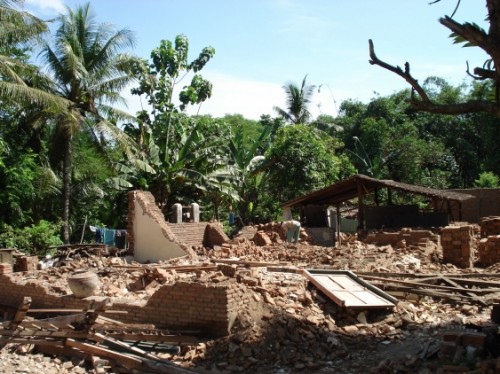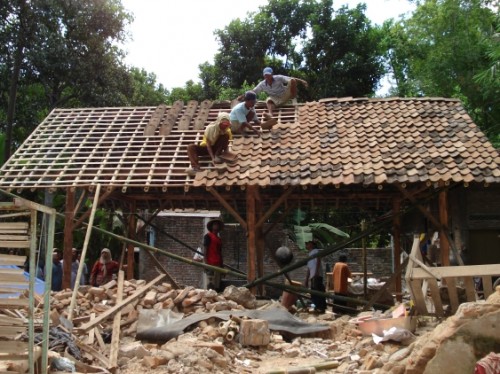
Don’t Hang Banners, But Ban Corruption
29 June 2006
By Alex Flor
„I can’t recall how I got out here, but somehow I did. I was sleeping when it happened,” says Pak Ridwan (not his real name), standing in front of a heap of rubble that once has been his house. He and his wife had no injuries when they found themselves outside their house after it collapsed. Others were less lucky. Six people, amongst them two children, lost their lives in this small village near Bantul, Yogyakarta, when the devastating earthquake hit this area on May 27th. The official death count for the whole area affected stands at 5,857.
While we listen to Pak Ridwan, people at the scene are busy cleaning unbroken tiles with coconut shells, others take them to thatch the roof of a nearby house under construction. Quite a big part of bricks, tiles and wood found in the rubble may be reused. There are no new construction materials to be seen.
A local NGO advises people how they can rebuild or repair houses in a way that makes them less vulnerable for eventual earthquakes yet to come. They also brought some basic tools, food and tarpaulins. All the construction work is done by the people themselves. Gotong Royong, mutual help has a long tradition in this part of Java. Local NGOs fear that „Food for Work Programs” set up by some international organizations could bring this solidarity to a standstill.
The dimension of devastation is enormous. Preliminary estimates by the National Planning Agency BAPPENAS count a total of 358,000 damages in housing, 75,000 of which are totally destroyed, and another 116,000 heavily damaged. But different to the tsunami hit areas of Aceh where whole neighbourhoods were literally taken away by the sea, life in the region around Bantul is far from being extinguished.
Having observed another village locals serve us with tea and cooked bananas. Covered only by the canopy of tall trees spending some shadow in the heat we sit at a table in the „public kitchen” that was set up by the villagers. „The wells are undamaged,” one of our hosts explains where the water to cook tea is coming from. They can still find crops from their gardens. „Now the rice harvest will begin,” says another man. You wouldn’t find trees, gardens, paddy fields or potable water in post-tsunami Aceh only three weeks after the disaster. Everything was destroyed or covered by salty mud, debris and even corpses then. But here in the province of Yogyakarta damages on infrastructure are by far less serious. Accordingly, the need for international experts is very limited. There are lots of good skilled planners and technicians on site who can do the necessary work. And after the first chaotic days, when the airport was closed and everybody got stuck in traffic jams, transport logistics are no more a serious problem either. Many middle and upper class houses as well as shops and private company buildings show only minor damages. Surprisingly some of the worst destructions may be seen at public buildings like the Technical High School (STIE) or the Sports Centre in the city of Yogyakarta. Obviously these buildings were poorly constructed. Does this give clue on the particular high level of corruption in the public sector? However, the vast majority of badly damaged buildings are simple houses of the poor, no doubt poorly constructed due to a lack of money available.
Thus there is still a huge need for support. Hundreds of thousands of people are living in tents. More than 3 billion US$ are needed for rehabilitation of physical damages, estimates a preliminary report by BAPPENAS. Even many of those whose houses are still intact prefer to live in tents since they are afraid of aftershocks. Trauma healing is certainly something that keeps experts and volunteers busy for the time being.
Though it’s common knowledge that large parts of Indonesia are located at the so-called Rim of Fire, the government seems ill prepared to tackle major natural disasters like earthquakes, tsunamis or eruptions of volcanoes. Only small amounts in national and local budgets are allocated for emergency funds. „Up until now, there was only little help delivered by the government. Only yesterday they sent some rice,” says Pak Ridwan pointing at a couple of sacks piled in one of the tents. As head of the village Pak Ridwan is the one who is in steady contact with government officials to report on the needs of his village. ”I don’t know whether money is the main problem. But sadly the bureaucratic behaviour of the administration didn’t change significantly at the sight of this disaster. We would still need stamps and signatures down from the district level through the sub-district level before anything will happen,” he says. „And now people have to pay again for medical treatment. Only for a short time people could go to the hospital without being charged.” There are lots to be seen with broken arms or legs who are in need of medical aftercare. How many will be crippled, since they just don’t have the money to pay for it?
Now local NGOs that associated themselves with SUARA, the Solidarity for Emergency, Advocacy and Rehabilitation, expect a „social aftershock” to take place. They strongly object to new loans given to Indonesia’s government to tackle the disaster, as was discussed by the recent CGI-Meeting (CGI – Consultative Group on Indonesia), the consortium of foreign donors. Instead activists of SUARA ask for a debt moratorium to ease the country’s financial burden. Under best circumstances rehabilitation will only lift the economy back to the level it has been before. Thus, loan interests may not be covered by added value gained from this activity, but will add to the gross financial burden of the country. „It violates the principle of humanity,” says a press release by SUARA. They also ask for means to effectively ensure transparency and accountability of all relief projects. Some bad experiences in Aceh illustrate the importance of this demand, which is underlined by the sight of the bizarre ruins of public buildings in Yogyakarta.
Civil and political organizations hang hundreds of banners with slogans to give moral support to the victims. But „what they need right now is help that is concrete, real, and visible. Not just empty words that are unrealistic like these ones,” writes a victim contributor in SUARA’s bulletin. <>
Suara Website (only in Bahasa Indonesia): http://www.suarakorbanbencana.org/
the author is vice chair of the board of INFID and director of Watch Indonesia!, Germany









